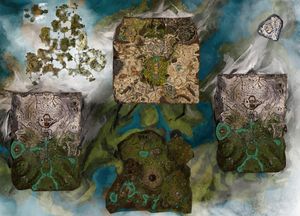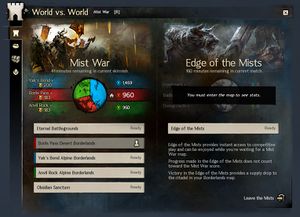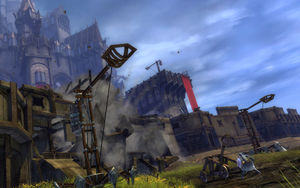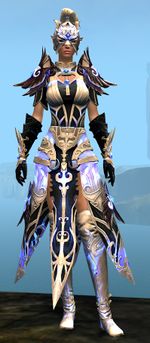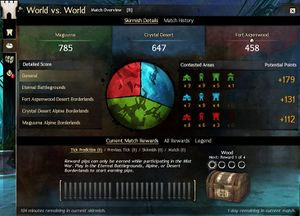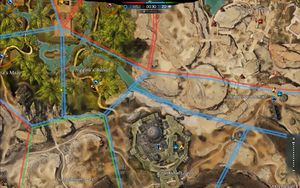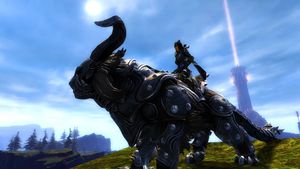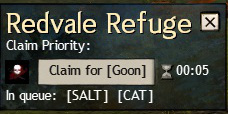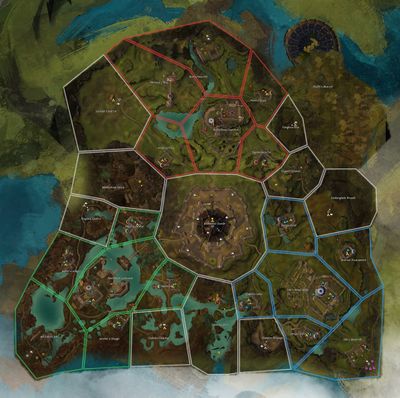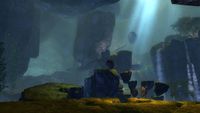World versus World
“Storm castles and conquer territories in World versus World! Enter the Mists through Eternal Battlegrounds asura gates in major cities, or by clicking the castle icon in the top left corner of your screen. Press [B] to see your WvW progress.
— Level 60 and level 80 rewards.
World vs. World (WvW), lorewise known as the Mist War, is a game mode combining PvP and PvE elements, where three teams of players engage in open-world combat against each other for objectives and resource control. World versus World is one of the three main game modes, along with the Player versus Environment and Structured PvP.
WvW takes place across five large maps with up to several dozen players per map. Besides open field battles, players can besiege and defend objectives such as Keeps and Towers with siege weapons, skirmish over resource camps, and participate in PvE-type dynamic events. Instead of experience, participating in WvW grants World Experience (WXP), a system of account and character progression. Accumulating enough WXP increases a player's World Rank and provides access to new abilities through WXP upgrades.
Players joining WvW will have their level and attributes dynamically adjusted to level 80. However, their equipment attributes will remain locked to their equipment level, so entering at a low level is not recommended. Although equipment can be obtained within WvW, this game mode does not reward normal experience. Character levels may instead be gained by using Tomes of Knowledge, obtained from rank increase rewards and WvW reward tracks.
WvW has a hybrid reward system that allows to gain rewards both passively over time, and through active gameplay. The passive reward system consists of the always enabled Skirmish reward track and selectable WvW Reward Tracks, both based on continuous participation in WvW activities. Active rewards are granted for successful capture or defense of objectives, as well as defeating enemy players and NPCs. In addition, currencies and certain items, exclusive to the game mode, can be traded to a vendor in exchange for extra weekly reward.
Lore[edit]
- Primary article: Mist War
Getting there[edit]
- Getting there
- Open the World vs. World panel (default B) and select which WvW map to enter.
- Paid accounts may access this panel at level 31, whilst Free-to-play accounts will gain access to this panel account-wide once one character reaches level 60.
- By using the Asura gates located at the Mist Portals point of interest in Lion's Arch to each WvW map. Each WvW map also has asura gates to travel to other WvW maps.
- If already in a WvW map, Waypoints can also be used to travel between WvW maps.
- Leaving
- You may leave the Mists through the World vs World UI window, through an Asura Gate for Lion's Arch, or through relogging/swapping characters.
- You may also leave by using teleportation Gizmos such as the Royal Terrace Pass.
- You will be forcibly kicked to the character selection screen if your character is idle for 15 minutes.
- You will always be returned to the map you were in before entering WvW. You cannot be returned to a Player instanced map, such as story missions or home instances.
Maps[edit]
- Primary article about the region: World vs. World
There are four main maps for combat, with a fifth provided in case of map queues, which are:
- Eternal Battlegrounds
- Blue Alpine Borderlands
- Red Desert Borderlands
- Green Alpine Borderlands
- Edge of the Mists
Rewards[edit]
World versus World has a hybrid reward system that allows players to gain rewards both passively over time, and through active gameplay.
Passive Rewards[edit]
- See also: Participation (WvW)
The passive reward system consists of two types of reward tracks, Skirmish reward track and WvW Reward Tracks, both based on earning points in 5 minute intervals ("ticks") while participating in WvW activities. Reward tracks require maintaining a certain level of participation in WvW activities in order to gain "pips", points that progress the track. Rewards are provided in tiers when sufficient number of points is accumulated for each tier.
The Skirmish reward track, which is always enabled, serves as the primary source of ![]() WvW Skirmish Claim Ticket currency, used for purchasing various rewards from the vendors, including WvW-exclusive legendary equipment.
WvW Skirmish Claim Ticket currency, used for purchasing various rewards from the vendors, including WvW-exclusive legendary equipment.
WvW Reward Tracks are activated by the player in the World vs. World panel and provide a wide variety of rewards, ranging from crafting materials to equipment. Some WvW Reward Tracks can be repeated infinitely, others – only completed once.
Loot Based/Active Rewards[edit]
For active rewards, successful capture of defense of objectives, as well as defeating enemy players and NPCs, provides various equipment, crafting materials, and loot bags, including a chance for rare high value items. Additional items can be purchased from vendors Dugan and TEID-07 Unified Vendor System in exchange for WvW-exclusive currencies and items obtained from loot.
Below is an representative list of rewards that can be primarily received through active gameplay and, partially, through the reward tracks:
- Loot bags from killing enemy players or NPCs
- Badges of Honor (currency)
- World Experience (WXP)
- WvW Rank titles and Achievement titles
- Guild Commendations and Guild Favor (while a Guild Mission is active)
- Karma - from event completion, dependent on the objective per these tables.
There are additional Objective Scaling Rewards for participating in objective events, both capture or defense, of: towers, keeps, and castles.
Equipment[edit]
Players may earn a variety of unique WvW-exclusive armor and weapon skins, including WvW Legendary armor and the WvW Legendary Backpiece, Warbringer.
- General equipment
- Armor, weapons, and trinkets of Exotic rarity with selectable attribute combinations — purchased from the merchant TEID-07 Unified Vendor System
- Armor
- Triumphant armor (Tier 1 Exotic WvW Armor, obtained via the Triumphant Armor Reward Track)
- Triumphant Hero's armor (Tier 2 Exotic, Ascended, or Legendary WvW Armor)
- Mistforged Triumphant Hero's armor (Tier 3 Ascended or Legendary WvW Armor)
- Weapons
- Mistforged Obsidian weapons (ascended, requires respective exotic Obsidian weapon)
- Obsidian weapons (exotic)
- Mistforged Hero's weapons (both exotic and ascended variants, requires respective rare Hero weapon)
- Hero's weapons (rare, obtained via the Hero Weapon Reward Track)
- Mist Lord's weapons (ascended)
- Officer's Remnant weapons (exotic, a rare chance from Mist-Hardened Lockbox or from Trading Post)
- Corrupted Hero weapons (exotic, a rare chance from Mist-Hardened Lockbox, or ascended, requires respective rare Hero's weapons)
- Non-game-mode specific ascended stat-resettable trinkets.
- WvW attribute infusions
- Mistwalker Infusion — a WvW-exclusive cosmetic infusion
Mechanics[edit]

Interface[edit]
The image to the right illustrates the score interface used in Borderlands and Eternal Battlegrounds, located at the top of your screen when inside those locations. Edge of the Mists uses a different interface.
- Click this arrow at the top of your screen to open the Skirmish Details window.
- The current war score of all 3 teams, cumulative throughout all Borderlands and Eternal Battlegrounds.
- Potential points that may be added to the war score of your team when the current tick timer expires.
- Current Tick Timer: the time remaining until those points are applied.
- Number of supplies you are holding.
- Amount of time left in current Skirmish
- Mouseover window with breakdown of potential points for all 3 teams
- Your team is indicated by the background color of both [3] and [5]
Opening your World vs World window (default B) will reveal 4 tabs:
| Tab | Function |
|---|---|
| Mist War |
|
| Match Overview |
|
| Reward Tracks |
|
| Rank and Abilities |
|
Objectives and Territories[edit]
There are four different types of major objectives: Camps, Towers, Keeps, and one Castle. These locations can be captured and held for War Score points. Depending on the type of objective, there are a number of obstacles that must be overcome before it can be captured. The following table lists the defenses that each objective type possesses:
| Resource camp | Tower | Keep | Stonemist Castle | |
|---|---|---|---|---|
| Guards | 1 |
1 |
1 |
1 |
| Walls/Gates | 0 |
1 |
1 |
1 |
| Lord1 | 0 |
1 |
1 |
1 |
| Inner Walls/Gates | 0 |
0 |
1 |
1 |
- 1. Champion Tower Lord, Champion Keep Lord or Legendary Castle Lord. Different variants are present on the Red Desert Borderlands map.
Held objectives immediately begin progressing towards automatic upgrade tiers that improve that objective's defensive capabilities via the Objective Upgrade mechanic. These upgrades are obtained by Supply Dolyaks successfully reaching the objective and by total continuous claimed time passed.
Once an objective has been captured by a team, the area surrounding (known as the Territory) it will gain a border of that team's representative color. While within that border, players from the capturing team will be able to Glide (provided they have the first rank in War Gliding Mastery). Completing the Bloodlust in the Borderlands event by capturing three ruins in a Borderlands map will capture the territory for all five ruin sections. If lost to another team, three more ruins must be captured and held to retake all five sections.
Supply[edit]
Supply is a special resource in WvW, used for the following:
- Constructing Siege Weapons.
- Repairing the gates and walls of Towers, Keeps, and Stonemist Castle.
- Using traps (placed on the ground) and tricks (thrown directly at the enemy).
Supply is therefore the basic resource around which WvW revolves. Supply can only be gathered by the team which holds the objective. Supply does not show up in your inventory, but the number of currently held supply is shown on the WvW interface. Commanders can access supply reports with chat commands.
Siege weapons[edit]
Siege Weapons are environmental weapons that can be built to accomplish a particular purpose.
Player damage is severely limited against doors, and reduced to zero against walls, therefore, siege weapons such as Flame Rams and Catapults are an integral part of capturing a walled objective. With the exception of the siege golem, all siege weapons are stationary and cannot be moved. Counter-Siege weapons such as Ballistas and Shield Generators are also used to mitigate or destroy enemy siege.
Certain siege weapons like Cannons or Burning Oil can only be acquired through objective upgrades. These siege weapons do not require blueprints.
Communication[edit]
- See also: Chat panel, Voice chat
WvW relies heavily on /Squad chat, /Map chat, and /Team chat. Enemy players cannot read the opposing teams' /Say, /Map, or /Team chats. Many servers and guilds utilize community Voice chats in addition to in-game text-chats. Locating a voice server address is generally as easy as asking Map or Team chat once within a Borderland.
Tips:
- You can display which borderland a player is in next to their name within the chat box, by clicking the chat cogwheel and checking the box marked "Show Channel Tag".
- Party chat may be used while within a squad to broadcast only to the sub-group and not to the entire squad.
- See Common Terms and Abbreviations for more information.
Combat[edit]
WvW is first and foremost, a Player vs. Player game-mode. You are rewarded with loot and World Experience for killing enemy players via combat. Killing players also awards Points-Per-Kill (PPK) that go toward your server's War Score (see below).
Enemy Players[edit]
Killing an enemy player in WvW will result in gaining world experience and loot. Loot often includes Badges of Honor, but is otherwise randomly generated. The defeated player does not lose anything through being defeated.
The names of players from other worlds are not shown. Instead, they appear as "<world> <rank title>". For example, a player from the Darkhaven world at World Experience Rank 3 will be "Darkhaven Invader". Guild tags are still shown, appended to their name.
Enemy players cannot see your name or anything you type in any chat, with the exception of whisper or guild chat. Emotes still log a description in emote chat, though the description will read as "Silver Invader laughs with Bronze Soldier", eliminating any names. "RP" chat (/e chat) will not appear to enemy players.
Spawn points[edit]
Spawn points are waypoints that exist in each battleground. There are two types of spawn points: those which are permanently open and those that must be activated or built towards.
- Permanent Waypoints: Each World versus World map includes three permanent waypoints, one for each team (see table below), to allow basic access to the map regardless of which team is dominating. These waypoints cannot be used by enemy teams and are protected by Legendary Defenders. Each spawn point includes a set of NPCs where players may reinforce their armor, sell loot, or buy blueprints. There are several paths out of each spawn location. It is difficult for an enemy team to camp a spawn directly, as players and most NPCs in the spawn area are invulnerable and the multiple exits are usually impossible to block.
- Objective Waypoints: Other waypoints can be added to some objectives through objective upgrades and the Emergency Waypoint Tactic. These waypoints provide quicker access across the map. A waypoint cannot be used if the objective it is housed in is under attack, with the exception of Emergency Waypoints. Emergency Waypoints are visible even if you are on a different WvW map.
Reviving players[edit]
Players in WvW may only revive downed or defeated players from their own team. Reviving a defeated player requires the reviver to be out of combat; the same mechanism is valid for any NPCs. If a player enters combat while reviving a defeated player or NPC, they may continue the revive channel. If the revive channel is broken, the reviver will be unable to restart reviving the player or NPC until they are once again out of combat.
Unlike in PvE, only one player may rally off a single kill. Rallying prioritizes the nearest downed player with damage qualification, and players cannot rally by killing basic creatures.
A defeated player will have a 5 minute timer applied to them, during which time they may use any available waypoint. When the time runs out, the player will be forcibly revived at their team's spawn point for that map.
Map capacity[edit]
The various maps can hold a limited number of players. If this cap is reached, the map will gain a queue. Players can swap maps while in a queue without losing their place, but swapping characters will drop them from the queue. Edge of the Mists technically has no queue, as a new map will open as required.
Player limits are based on the server resources being used. The limit number is split equally among all three worlds.[1]
Movement[edit]
Gliding[edit]
Gliding in WvW is unlocked separately from PvE, through spending World Ability Points for the War Gliding Mastery. It requires purchase of Heart of Thorns to unlock. Gliding is possible only in territories controlled by one's own world. Gliding from one's territory to another world's or unclaimed territory will display the message "You are entering a no-fly zone. Land or turn back now." and the effect Gliding Disabled Warning is displayed. This effect disables the redeployment of the glider and gives the player a few seconds before forcing the player to stop gliding.
Mounts[edit]
- Primary article: Warclaw
Most mounts are disabled in WvW. The exception is the Warclaw, a mount announced by ArenaNet in February 2019 and released on March 5th of the same year. Use requires purchase of the Path of Fire expansion and spending 1 World Ability Point in the Warclaw Mastery. It features several abilities to help players move faster, take down gates, or engage in battle, and several skills to supplement, but not replace, other typical WvW activities. During use, nearby unmounted players will receive Warclaw's Blessing and run at a similar speed.
Score[edit]
Skirmishes[edit]
Matches are 1 week long, split into 2-hour time slices called Skirmishes. During a skirmish, worlds will earn War Score based on how many objectives are held, with War Score being used to determine the winner of each skirmish. When each 2-hour skirmish ends, the War Score is reset, but the actual state of the map and objectives remains unchanged.
Skirmishes award Victory Points based on placement (1st, 2nd or 3rd place within each match, as per the War Score) and player population per skirmish, per region (NA/EU). Higher activity skirmishes will have a larger effect on victory points than lower activity.[2] After 84 Skirmishes (one week with 12 skirmishes/day), Victory Points are used to determine first, second and third place.
As of December 13, 2024, the current Victory Point distribution is as follows: (No further subcateogries were given for Oceanic (OCX) or Southeast Asia (SEA))
- Europe (EU)[2]
| Skirmish | Victory Points | Total VPs/Skirmish relative to highest | |||
|---|---|---|---|---|---|
| Start | End | 1st | 2nd | 3rd | |
| 0:00 | 2:00 | 6 | 4 | 2 | 14.29%
|
| 2:00 | 4:00 | 6 | 4 | 2 | 14.29%
|
| 4:00 | 6:00 | 6 | 4 | 2 | 14.29%
|
| 6:00 | 8:00 | 15 | 10 | 5 | 35.71%
|
| 8:00 | 10:00 | 15 | 10 | 5 | 35.71%
|
| 10:00 | 12:00 | 15 | 10 | 5 | 35.71%
|
| 12:00 | 14:00 | 15 | 10 | 5 | 35.71%
|
| 14:00 | 16:00 | 15 | 10 | 5 | 35.71%
|
| 16:00 | 18:00 | 30 | 20 | 10 | 71.43%
|
| 18:00 | 20:00 | 42 | 28 | 14 | 100%
|
| 20:00 | 22:00 | 30 | 20 | 10 | 71.43%
|
| 22:00 | 24:00 | 15 | 10 | 5 | 35.71%
|
- North America (NA)[2]
| Skirmish | Victory Points | Total VPs/Skirmish relative to highest | |||
|---|---|---|---|---|---|
| Start | End | 1st | 2nd | 3rd | |
| 0:00 | 2:00 | 33 | 22 | 11 | 100%
|
| 2:00 | 4:00 | 33 | 22 | 11 | 100%
|
| 4:00 | 6:00 | 21 | 14 | 7 | 63.64%
|
| 6:00 | 8:00 | 9 | 6 | 3 | 27.27%
|
| 8:00 | 10:00 | 9 | 6 | 3 | 27.27%
|
| 10:00 | 12:00 | 9 | 6 | 3 | 27.27%
|
| 12:00 | 14:00 | 13 | 8 | 4 | 37.88%
|
| 14:00 | 16:00 | 13 | 8 | 4 | 37.88%
|
| 16:00 | 18:00 | 13 | 8 | 4 | 37.88%
|
| 18:00 | 20:00 | 13 | 8 | 4 | 37.88%
|
| 20:00 | 22:00 | 13 | 8 | 4 | 37.88%
|
| 22:00 | 24:00 | 21 | 14 | 7 | 63.64%
|
Prior to December 13, 2024 the amount of Victory Points awarded at the end of each Skirmish was the same for all skirmishes being 5, 4 & 3 for 1st, 2nd & 3rd place respectively.
War Score[edit]
All objectives controlled by each world provide points/score based on the tier of each objective (see table below). Every 5 minutes ("tick"), the points gained from objectives are added to the War Score of each world (PPT = Points Per Tick). Additionally, capping an enemy's objective will also add points to the War Score, based on the tier of the objective. Finally, defeating an enemy player awards 3 warscore.
| War Score Awarded/Tier of Objective Upon Capture | ||||
|---|---|---|---|---|
| Objective | Base No upgrades |
Tier 1 Secured |
Tier 2 Reinforced |
Tier 3 Fortified |
| Camp | 2 | 3 | 4 | 5 |
| Tower | 4 | 12 | 24 | 40 |
| Keep | 8 | 24 | 48 | 80 |
| Castle | 12 | 36 | 72 | 120 |
| War Score Awarded/Tier on Each Tick | ||||
|---|---|---|---|---|
| Objective | Base No upgrades |
Tier 1 Secured |
Tier 2 Reinforced |
Tier 3 Fortified |
| Camp | 2 | 3 | 4 | 5 |
| Tower | 4 | 6 | 8 | 10 |
| Keep | 8 | 12 | 16 | 20 |
| Castle | 12 | 18 | 24 | 30 |
Killing or finishing (stomping) an enemy will add three points to the War Score (PPK = Points Per Kill). Stomping an enemy with the Borderlands Bloodlust effect will add one extra point.
Killing a hostile dolyak is worth one point, while escorting a friendly delivering dolyak provides one point at each destination.
Guild Claiming and Tactics[edit]
- Primary article: Objective upgrade
On capturing an objective, an option to claim the objective for your guild will appear. Generally the guild with the highest number of people within the objective on capping will be able to claim the objective first, followed by the 2nd largest, and so on. Claiming an objective allows guilds to activate unique effects known as Improvements, which are passive, and Tactics, which must be actively used, through the use of War Chest Schematics.
Map-specific mechanics[edit]
Monuments / Ruins[edit]
Monuments are present in each Borderlands: nine shrines in the Desert Borderlands, and five ruins in the center of both Desert and Alpine Borderlands. Shrines grant stacking bonuses to nearby keeps, and provide a Blessing of Elements to players who capture or interact with the shrine. Ruins grant team-wide bonuses to the team that holds them.
The ruin monuments in each of the Borderlands maps may be captured to gain the Borderlands Bloodlust effect, which grants various bonuses, depending on how many ruins are captured.
Mercenaries[edit]
Three groups of NPC mercenaries are present in the Eternal Battlegrounds:
- Dredge Camp (Molevekian Delve)
- Hylek Camp (Darkrait Inlet)
- Ogre Camp (Orgath Uplands)
Helping out the mercenaries by completing a dynamic event will result in them temporarily joining your world's side. For example, saving Orgath Uplands from hostile harpies will result in Ogres joining your cause. Allied mercenaries then begin attacking, capturing, and reinforcing nearby supply camps.
Champion and Veteran Creatures[edit]
Besides Champions defending spawn and Towers, there are other sub-objective Champions and Veterans that may be killed. These don't provide any benefit to scoring or territory, though some are used for dailies.
In the Eternal Battlegrounds, there are two champion creatures. These are the Champion Arboreal Spirit and the Overgrown Grub.
In the Borderlands maps, there are veteran creatures that spawn at various locations on each map.
Map-based differences[edit]
Eternal Battlegrounds[edit]
- Green, Blue, and Red Keeps on Eternal Battlegrounds differ from one another in terms of Offensive and Defensive capability.
- Green is easily defensible with its extensive moat.
- Blue is fairly neutral, containing both moderate terrain hazards and more easily siege-able walls.
- Red has multiple points where Trebuchets can hit enemy objectives, making it a good offensive keep.
Borderlands[edit]
- The Garrison in each borderlands is very close to the spawn of the home team, giving them a significant advantage when defending.
- Other teams' spawns are closer to the lesser Keep objectives, in comparison.
Your team's "Home Borderland" is denoted by a little House icon in the WvW Map Selection panel next to your server's (or host server's) name. (i.e. If your server is Fort Aspenwood, your Home Borderland is Fort Aspenwood Borderland.)
- The Blue Team will have the Blue Alpine Borderlands map as their home borderlands.
- The Red Team will have the Red Desert Borderlands map as their home borderland.
- The Green Team will have the Green Alpine Borderlands map as their home borderlands.
Match-making[edit]
Initial team creation[edit]
Team creation was overhauled in June 2024 with the release of the World Restructuring update. Teams (blue, green, and red) are no longer associated with a player's world, and are instead based on groups of WvW guilds brought together by the match-making system with the nominal aim of creating balanced populations across all teams. Under the current system, match-making is performed every four weeks.
The intention is to eventually permit groups of guilds to ally under an Alliances system which has not yet been released. A sixth guild slot was instead created to allow players to play together under a larger alliance guild.
Weekly WvW reset[edit]
At Weekly Reset, the Scoring window from the WvW UI will pop-up and show the final calculated scores for all teams in the match. With the current system, this score determines your team's placement for the next week (with the exception of the first week, see below). After a short while, players will receive a warning in yellow text saying that reset has begun and that they will be kicked out of WvW while the new match-ups are being calculated. Approximately 5-10 minutes later, players will be able to enter WvW again. Generally, matches are fully reset roughly 3 minutes after the hour, though exceptions may occur.
Weekly match-making[edit]
In 2017, Anet implemented a 1-up, 1-down system, where a match's 1st place team (with the most world score) would go up a tier, 2nd place would stay in their current tier, and 3rd place would go down a tier. In the next match, the server that moved up is designated the Red team, the server that stayed is the Blue team, and the server that went down a tier is designated Green team. The server at the top of each tier is designated Green team. The initial match after a server relink still falls back on the old Glicko method, with Glicko data continuing to be updated.[3]
At the end of the week, if two teams are tied in victory points, those two teams will stay in the current tier and not be moved up/down (as applicable), and the teams in other tiers that would've moved up/down as a result stay in their current tiers as well. The tied teams will get placed on a team based on their final war score at the end of the week (i.e. if blue and red teams are tied at the end of the match but red had more war score, both teams stay in the same tier but the team that was previously on red will be on blue and the team that was previously on blue will be on red. The team in the tier below would stay in green and not be moved up a tier.)
The current match ups are provided below.
Roles[edit]
WvW battles generally fall into a spectrum between one-on-one combat and zergs.
Zerg[edit]
In most WvW, there is some form of zerg where a large number of players congregate to capture objectives. A zerg can be thought of as 25 or more players sufficient to cause an orange battlecross on the map when engaged in combat. A particularly large group can be referred to as a map blob. A zerg will usually be lead by a ![]() commander tag. This allows friendly players who are not part of the zerg to know the current position of the zerg.
commander tag. This allows friendly players who are not part of the zerg to know the current position of the zerg.
Roles will have overlap as determined by class abilities and traits, but as a generalisation most tend to fall under a standard RPG archetype.
- Damage
- Heal
- Support (boons)
- Utility (stealth, boon removal, revive)
Combat among zergs can be divided into open field and sieging. Open field fights, as indicated by their name, generally occur away from walls and even away from objectives, with little to no siege gameplay involved. Sieging, in contrast, involves an attacking zerg dropping blueprints and building siege to take an objective. This can be as simple as creating a couple of Flame Rams, or as complicated as dropping Trebuchets, Shield Generators, and Ballistas all at once. Similarly, defending zergs may drop their own siege, such as a multitude of Arrow Carts, counter-Trebuchets, and Shield Generators. These states of being are fluid, and zergs tend to flow between them as needed.
Tips:
- Many commanders utilize Voice Communication programs such Discord or Teamspeak to easily and quickly send orders and receive scouting information. If it is not supplied, ask your squad (/squad) or your team (/team) if they can send you the associated link to their program of choice. Communication is important to successfully fighting other organized groups.
- Join your zerg's squad, either through asking for an invitation or manually adding yourself to an open one. This can easily be done by right clicking on a commander tag on the map and selecting "Join squad". If you are not in a squad, you are far less likely to receive any party buffs, healing, or support, as these skills target party members first.
- Play a class and use traits and gear that will benefit the zerg. Servers, guilds, and community websites will all provide examples of preferred builds to bring. If you're unsure of what to use, ask team chat. A zerg of players with synergistic builds will do far better than one without.
See Common Terms and Abbreviations for more information.
Scout (Scouting)[edit]
Scouts are those individuals who tend to look out for one or more objectives. They generally focus on broadcasting enemy movements and aiding in the defense of key objectives. What "scouting an objective" entails may vary from Keeps, Towers, Camps, or even enemy zergs, but the responsibilities of a scout generally include:
- Provide precise information on enemy numbers and siege placement if the objective is tagged or is being attacked.
- Staying at and maintaining lookout for a specified objective even if there are fights happening elsewhere in the same map. They may also refresh siege to keep it from despawning.
- Slowing enemies from breaking into the objective by using Siege Disruptors and/or defensive siege
- Calling for assistance, if needed, against an enemy zerg.
- In many cases, scouts may also help run supply dolyaks to the objective in order to upgrade and resupply.
To provide rewards to a scout, a commander can share participation for the WvW Reward Track if the person has joined the squad, and the squad has a minimum of 5 members.
Successful scout reports should be abbreviated while still conveying relevant information. A good call out will have enemy numbers, the team or guild group, the nearest relevant objective, possible siege status, and other relevant information. Scouts should also keep in mind whether it's best to use Team chat (/T) or Map chat (/M) when making a call out. A team chat call-out means very little if your map is currently queued, for example.
Examples:
- [# of players] [color/team name/guild group] @ [objective + objective tier] [siege status], [wall/gate location and health %], [optional additional info]
- Blue blob @ t3 hills north outer with 3 catas, wall 50%
- 20 [Guild] @ t2 northwest tower, heading south towards Blue Tag.
Keep in mind that some alliances and groups will have their own abbreviations for certain terms. See below for common terms.
Roamer[edit]
Roamers are usually individuals or small (havoc) groups that go behind enemy lines to achieve objectives that would normally be impractical or impossible for a zerg. Objectives could include:
- Killing or deterring enemy stragglers and reinforcements
- Defending against small enemy groups and destroying supply caravans
- Capturing enemy camps
- Contesting/tagging/tapping - Attacking an enemy objective sufficiently that it (and its waypoint, if any) becomes contested
Roamers generally require high survivability and escapability but more importantly, above average fighting abilities to destroy opposing roamers and havoc groups.
Common Terms and Abbreviations[edit]
The following is a list of common terms and abbreviations that many, if not all servers use.
- Useful terms for describing objectives
- [X]BL - where [X] denotes initials or color of the primary server. (Fort Aspenwood Borderlands becomes FABL, Green Borderlands becomes GBL.) The home borderlands may be referred to as "Home BL" or "HBL". Useful in team chat to specify the map of referenced objectives; e.g. "BBL spawn tower" refers to the tower closest the home spawn point in the Blue Borderlands map.
- [Cardinal Direction][Objective] - Shorthand use of cardinal directions (North, West, South, East) to denote camps or towers to concisely name a Borderlands objective without having to memorize objective names across all borderlands. (Names of objectives change slightly depending on the color of the Borderland; e.g. Bluebriar tower is situated in the same relative area as Redbriar and Parched Outpost. In this case, all three aforementioned objectives are referred to as "southwest tower", or simply "SWT". In another example, the northernmost camp in a borderlands map could be referred to as "NC".)
- SM/SMC - Stonemist Castle in Eternal Battlegrounds.
- Garri/Garrison - The northernmost Keep in an Alpine Borderlands map, referring to either Blue Alpine Garrison or Green Alpine Garrison.
- Some players might also use the term to refer to Stoic Rampart in the Desert Borderlands map.
- Hills - The Eastern Keep in an Alpine Borderlands map, referring to either Askalion Hills or Shadaran Hills.
- Some players might also use the term to refer to Osprey's Palace in the Desert Borderlands map.
- Bay - The Western Keep in an Alpine Borderlands map, referring to either Ascension Bay or Dreadfall Bay.
- Some players might also use the term to refer to Blistering Undercroft in the Desert Borderlands map.
- Stoic/Earth/EK - Stoic Rampart, the northernmost Keep specifically in Desert Borderlands.
- Air/Air-keep/AK - Osprey's Palace, the Eastern Keep specifically in Desert Borderlands.
- Fire/Fire-keep/FK - Blistering Undercroft, the Western Keep specifically in Desert Borderlands.
- Ruins - Ruins of Power, the center region of each borderlands map. Bloodlust in the Borderlands takes place here.
- EWP - The tactic for Emergency Waypoint.
- Invuln - "Invulnerable." The tactic for Siege Dampener (formerly named Invulnerable Fortifications) has been activated.
- Paper - Used to refer to Tier 1 objectives. References the ease at which they can be taken due to a lack of strong defenses and upgrades. Usually references un-upgraded walls or gates.
- RI - Righteous Indignation is an effect gained by Objective bosses such as Tower Lords for 5 minutes following the capture of an objective.
- Useful terms for describing players and player behaviors
- AJ/Ass-Jam - When an enemy group engages (generally) behind another two groups that are already fighting.
- Bags - Refers to the Heavy Loot Bag dropped by a defeated enemy player. May also be used as pejorative slang to refer to enemy players.
- Blob/map-queue - 30-50 players, depending on the tier your server is used to. This term references the squad's ability to fill a map and start a queue for it.
- Chatmander - A commander who only delivers instructions via the in-game chat. (not to be confused with a Catmander).
- Cloud - A medium to large group of players with little to no organization or structure, usually without a Squad Commander.
- Commander/Comm/Driver/Tag - Various ways to denote a Squad Commander.
- Fight Guild - Refers to guilds who focus on taking fights, even if that means sacrificing objectives or points for their server.
- Guild vs Guild/GvG - Refers to organized fights between guild squad groups that occur outside of the context of an organic WvW matchup. May occur in secluded open field areas of WvW maps, typically in the Edge of the Mists Mists Arena or Armistice Bastion. See also: Raid vs Raid/RvR.
- Havoc - A small group of 5-10 people whose purpose is to assist their team by splitting forces out from the main enemy zerg, either by attacking alternate objectives or by harassing stragglers in the zerg.
- "Incoming/Inc" - Enemy players are moving towards the squad.
- OJs/X - Orange Swords will appear on the map to mark when at least 25 players have engaged in combat. Nicknamed OJs (oh-jays) for their orange color or X for the crossed swords appearance.
- Open field - Refers to areas of the map outside of objectives. Usually used when describing fighting areas. (Fighting open field vs. fighting within an objective.)
- Pick (Pick Squad) - A squad leader might designate 2-4 players in a zerg as "Pick". Their job is to focus high-priority targets and quickly take them down. (For example, sniping the enemy Commander.)
- Pin-sniping/Commander-sniping - When a player or group of players focuses on eliminating the enemy commander.
- Player vs Door/PvD - Refers to players directly attacking gates, occasionally without the aid of a Flame Ram.
- PPT/PPTer/PPTing - (See War Score) PPT stands for Points-Per-Tick, which are points gained from holding objectives. PPTers are groups or players that heavily focus on maximizing their team's PPT score. (PPTing)
- Pugmander/Pugmanding - When a Commander is leading a group of players (PUGs) that are not formally associated with one another by guild or agreement.
- PUGs - From the phrase "Pick-Up Group." Slang for player(s) not involved with a guild or organized group, or members of an organized group not part of the Commander's core group.
- Raid/Rally - Refers to an organized group of players logging in at a pre-arranged time to form a squad. These players are usually part of the same guild.
- Raid vs Raid/RvR - An organized fight similar to GvG but with less restrictions on team size and composition, these are typically played with 20 or more players on each team.
- RvRs involving teams of 30 or more players may be instead referred to as "Blob vs Blob/BvB".
- Rallybot - A derogatory term for allied or enemy players. This is generally used to call out players who are defeated early in a fight, causing the opposing team to rally.
- Ram, Cata, Balli, Treb, AC - Shorthand for various siege. (i.e. Flame Ram, Catapult, Ballista, Trebuchet, Arrow Cart).
- Roaming group/roamers - 1-5 people
- Tail - the Tail of the Zerg, used to describe a moving commander-led group where several players have fallen behind.
- Tap - Hitting an objective solely to cause it to become Contested. No siege is placed and those attacking the objective are only trying to hinder using the associated waypoint or are trying to cause confusion.
- Zerg - Anywhere between 15-30 people, depending on the tier your server is used to.
- Useful Zerging terminology (usually spoken by the commander)
- "Banner" - Refers to the Warrior skill Battle Standard, however this term is more often used as a synonym for "Signet" or "Glyph" (see below).
- "Blast" - Commander tells players to use Blast finisher skills on certain fields.
- "Bomb" - Commander tells players to place high damage skills in a certain area.
- "Breach/Breaches" - Commander calls for Scourges to use their Ghastly Breach skills.
- "Bubble", "Winds" or "Dome" - Commander either tells allied Spellbreakers to use their elite skill, Winds of Disenchantment, which appears as a large orange semisphere for ally bubbles, or a brown semisphere for enemy bubbles. Some organized groups may assign multiple bubbles, as done with Stab1/Stab2 (see below). Commanders often call out and maneuver the group to apply damage inside ally bubbles while avoiding enemy bubbles.
- "Bunker" - Commander tells players to bunker down - the Squad/Party hold their ground, placing AoE in front of themselves and letting the enemy run into it.
- "CC" - Commander calls for crowd control skills to be used, preferably hard CC.
- "Cleanse" - Commander calls for players to use Condition Clearing skills on allies.
- "Corrupts/Strip" - Commander calls for classes with boon corruption or removal skills to focus them in a certain area. (Usually Necromancers.)
- "Empower" or "Might up" - Commander calls for Guardians to use Empower, generating Might or for fire fields to be blasted. Also includes any other useful pre-fight boons.
- "Glyph" - Called out by Elementalists when they use Glyph of Renewal on downed allies.
- "Illu", "Illusion", or "IoL" - Called out by Mesmers when they use Illusion of Life on downed allies.
- "Lines" - Commander calls for "line" type crowd control skills such as Line of Warding, Unsteady Ground, or Static Field.
- "Pull" - Commander calls for players to use "Pull" type skills such as Grasping Darkness, Chapter 3: Heated Rebuke, or Into the Void. (Typically used to pull enemies off of a wall or into a damage area.)
- "Reflects" - Commander calls for abilities that reflect or destroy/block projectiles to be placed between the zerg and the enemy, as a counter for projectile heavy groups.
- "Resistance" - Commander calls for classes that give Resistance—such as Firebrands, Heralds, and Mesmers—to share it with allies.
- "Shades" - Commander calls for Scourges to use Shade skills.
- "Signet" - Called out by Guardians when they use Signet of Mercy on downed players.
- "Spike" or "Range spike"- Used interchangeably with "Bomb". Commander tells players to place high damage, typically ranged skills in a certain area. Often used in conjunction with Pulls or CCs.
- "Stab/Stability" - Commander calls for stability. Sometimes assigned numbers, e.g. Stab1/Stab2 where stability 1 and stability 2 may be assigned to certain party members, typically Guardians.
- "Stealth/smoke/sneaky" - Commander tells players to grant Stealth to the squad through either stealth abilities such as Sneak Gyro or blast finishers combined with a smoke combo field such as Smoke Cloud.
- "Tomes/Tome 1, 2, or 3 skill <x>" - Commander calls for Firebrands to use their Tome of Justice, Tome of Resolve, or Tome of Courage abilities.
- "Water" - Commander calls for a Water field to be placed on the ground. The player that places it might say "small/large water on tag" depending on the type of water field that was dropped. Others are generally expected to use combat abilities with combo finishers (particularly blast) to produce healing.
- "Wells" - Commander calls for everyone to use their Well skills. (Typically Necromancer's Well of Corruption, and may also refer to Chronomancer's Gravity Well)
Jumping puzzles[edit]
The various WvW maps allow access to three jumping puzzles: Obsidian Sanctum, Emerald Sanctum, and Sapphire Sanctum (with Emerald and Sapphire collectively known as Mistwrought Vault). At the end of each of the puzzles is a chest that rewards some equipment, siege blueprints, and badges of honor, as well as the associated achievement from completing it. They may be difficult to complete as they are shared across the competing worlds, and players might encounter hostile players while trying to navigate the puzzle. Mounting and Gliding are both disabled in the three jumping puzzle zones.
Mistwrought Vault[edit]
Mistwrought Vault is a jumping puzzle in the north-west of every Alpine Borderlands map. This puzzle can be completed once per day on either Alpine maps (Blue or Green Borderlands). Completing one does not deny rewards for the other. This jumping puzzle is not present in the Desert Borderlands.
Obsidian Sanctum[edit]
Obsidian Sanctum is a jumping puzzle which can be accessed via the WvW menu, or through a door in any of the keeps in Eternal Battlegrounds. It is a separate instance from any of the other WvW maps, though players will continue to receive rewards each tick if they had sufficient participation before entering.
Historical notes[edit]
Match-making[edit]
Leaderboards for WvW rankings can be found online for both North America and Europe, however this uses the original world server teams and has not been updated for the current match-making system based on guilds nor the previous server-linking mechanic.
- Server linking mechanic
In April 2016, Anet implemented Server Linking to combat low-population servers (worlds) in WvW. [4] Lower population servers were "linked" with higher population ("host") servers, allowing them to play together. In the case of EU servers, the server's primary language was not necessarily a factor in how they were matched. A host server may have been given more than one link server. Servers were typically relinked on the last Friday of every second month. This was superseded by the current guild-based match-making system.
- Original weekly match-making system
Before 2017, Worlds in WvW were typically matched based on a modified Glicko rating,[5] so that high-ranked worlds would battle other high-ranked worlds, and low-ranked worlds would battle other low-ranked worlds. This attempted to ensure that every world had a fair chance of winning matches despite differing levels of player participation or skill.[6] First place gained 5 points, second place 4 points, and third place 3 points.
WvW bonus events[edit]
Occasionally, there is a Special event with unique effects or mechanics taking place in World versus World.
| Duration | Name | Effect / Description |
|---|---|---|
| 2015: December 16, 2014 to January 13 (UTC-7) |
Sneak Attack | Temporarily removed white swords that normally appear on objectives, such as towers or keeps in WvW, to encourage players to be more sneaky, as well as encourage players to defend valuable structures. Every player kill in WvW awarded a point towards their home world's war score, and every kill using a finisher would earn another extra point. Mist War Summons - Earn increased rewards in WvW during special events! +15% WXP (WvW only) +15% Experience from Kills (WvW only) +50% Magic Find (WvW only) |
| 2015: 11:00 AM, July 17 to 11:00 AM, July 24 (UTC-7) |
Golem Rush | Siege golems cost no supply to construct. Siege golems move at 100% increased movement speed. Siege golems deal 100% additional damage against players and other siege golems. Each kill on an enemy player will grant your team one point toward your realm’s total score. Mist War Summons - Earn increased rewards in WvW during special events! +15% WXP (WvW only) +15% Experience from Kills (WvW only) +50% Magic Find (WvW only) |
| 2018: 11:00 AM, June 8 to 11:00 AM, June 15 (UTC-7) 2019: 11:00 AM, April 26 to 11:00 AM, May 3 (UTC-7) |
No Downed State | Call of War - Earn increased rewards in WvW during events! +100% WXP +25% WvW Reward Track Progress +50% Magic Find (WvW Only) No Downed State - If you die, you will skip the downed state and go directly to being defeated. |
| 2018: 11:00 AM, Sept 28 to 11:00 AM, October 5 (UTC-7) |
Enhanced Bloodlust | Call of War - Earn increased rewards in WvW during events! +100% WXP +25% WvW Reward Track Progress +50% Magic Find (WvW Only) Enhanced Minor Borderlands Bloodlust - Everyone in your realm gains a 5% bonus to power, precision, toughness, vitality, condition damage, healing power, and ferocity for holding 3 ruins in any Borderland. This bonus goes up if you capture 3 ruins in a second Borderland. Invaders killed by finishers reward your realm with War Score. Enhanced Major Borderlands Bloodlust - Everyone in your realm gains a 15% bonus to power, precision, toughness, vitality, condition damage, healing power, and ferocity for holding 3 ruins in any Borderland. This bonus goes up if you capture 3 ruins in a third Borderland. Invaders killed by finishers reward your realm with War Score. Enhanced Superior Borderlands Bloodlust - Everyone in your realm gains a 30% bonus to power, precision, toughness, vitality, condition damage, healing power, and ferocity for holding 3 ruins in any Borderland. Invaders killed by finishers reward your realm with War Score. |
| 2019: 6:00pm, July 5, to 6:00 PM, July 12 (UTC-7) |
WvW Core Swap | A defeated player drops an orb that be picked up to gain access to skills of the based on the profession of the fallen player. Call of War - Earn increased rewards in WvW during events! +100% WXP +25% WvW Reward Track Progress +50% Magic Find (WvW Only) |
Tournament system[edit]
Previously, tournaments (known at the time as a season) were held for World versus World. Worlds fought other worlds over the course of multiple weeks to earn points; 1st place gave 5 points, 2nd place gave 3 points, and 3rd place gave 1 point. At the end of the tournament, players in each world would receive rewards for their world's ranking based on points earned. Throughout the tournaments, players could earn individual rewards through limited time achievements and achievement rewards.
Players who participated in tournaments received WvW Tournament Claim Tickets to trade for other rewards from the Battle Historian. These rewards included Hero's weapons, Mistforged Hero's weapons, Mini Dolyak, ascended accessories, and more.
Tournaments held:
- World vs. World Season 1 (October 16 - December 6, 2013)
- WvW Spring Tournament 2014 (March 28 - May 30, 2014)
- WvW Fall Tournament 2014 (September 12 - October 10, 2014)
Trivia[edit]
- The points awarded for holding Stonemist Castle was reduced from 50 to 35 points in the September 14th, 2012 update. This was done because Stonemist became easier to capture, due to the Legendary Castle Lord being moved to the lower floor (the initial placement of the Castle Lord on the second floor resulted in abuse of arrow carts firing from other floors into the lord room).
- Orbs of Power were removed in the November 1st, 2012 update.
- Between April 17th, 2013 and February 23rd, 2016, switching between NA, EU, and AUS servers removed your WvW ranking.
- Before April 11th, 2013, WvW matches reset at Saturday 00:00 UTC.
- The inspiration for World versus World came from Dark Age of Camelot's realm vs. realm battles.
- WvW and World vs World are the terms used by both players and by ArenaNet to refer to what is technically World vs World vs World. In game, NPCs refer to it as the Mist War or Battle for the Mists.
- Core WvW is also a term used by players where they are referring to Eternal Battlegrounds, Alpine Borderlands and Desert Borderlands.
- Edge of the Mists is excluded from "core" as it does not contribute score to the weekly matchup and has different mechanics.
- Core WvW is also a term used by players where they are referring to Eternal Battlegrounds, Alpine Borderlands and Desert Borderlands.
- Map completion used to include waypoints, points of interest and vistas in WvW maps.
References[edit]
- ^ https://forum-en.gw2archive.eu/forum/game/wuv/Willing-to-share-WvW-details/page/1#post1190009
- ^ a b c July 16 Competitive Update Preview
- ^ June 20th, 2017 patch notes
- ^ Massivelyop.com Guild Wars 2 begins testing WvW world linking today
- ^ Mike Ferguson, I’m a Guild Wars 2 Developer. AMA about the next Beta Weekend. Reddit
- ^ Mike Ferguson on Guild Wars 2 World vs. World ArenaNet Blog
